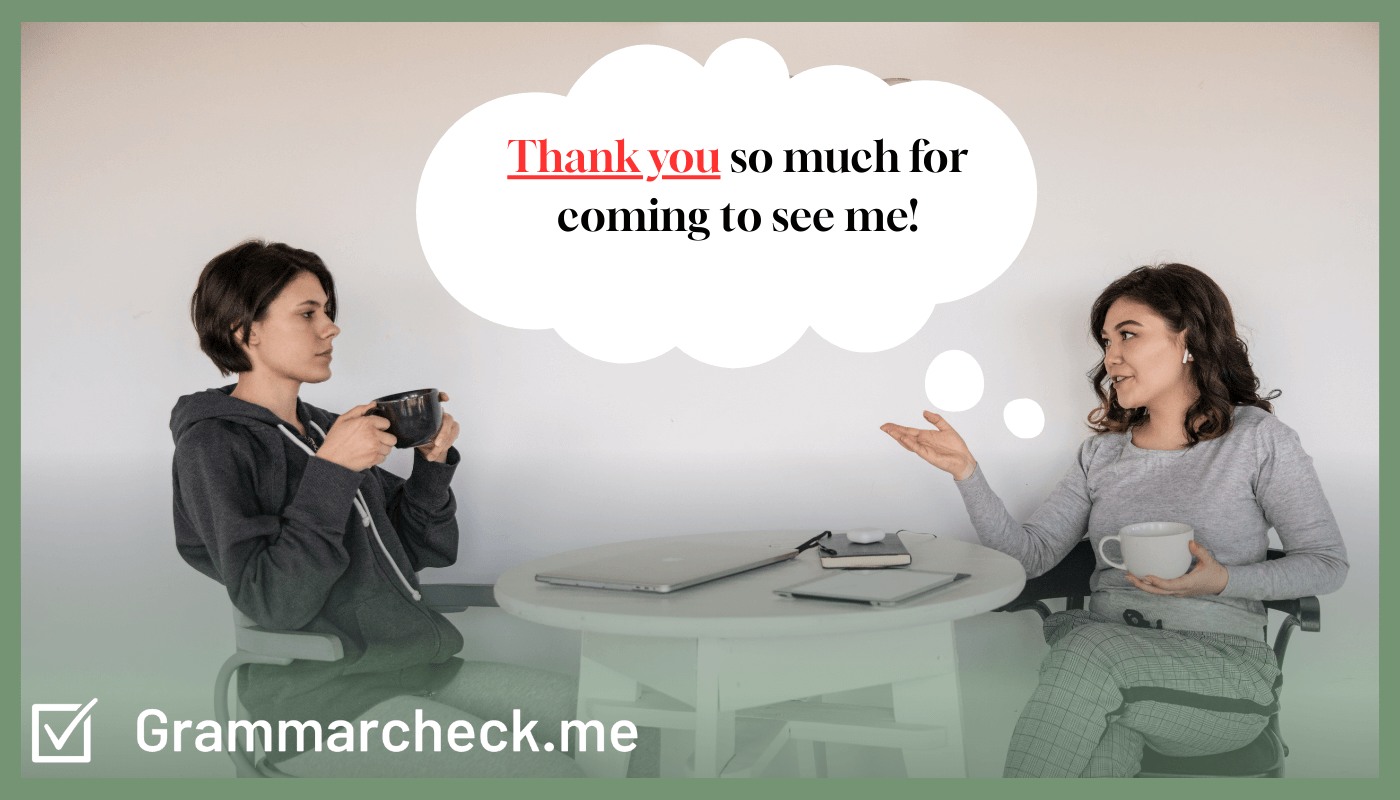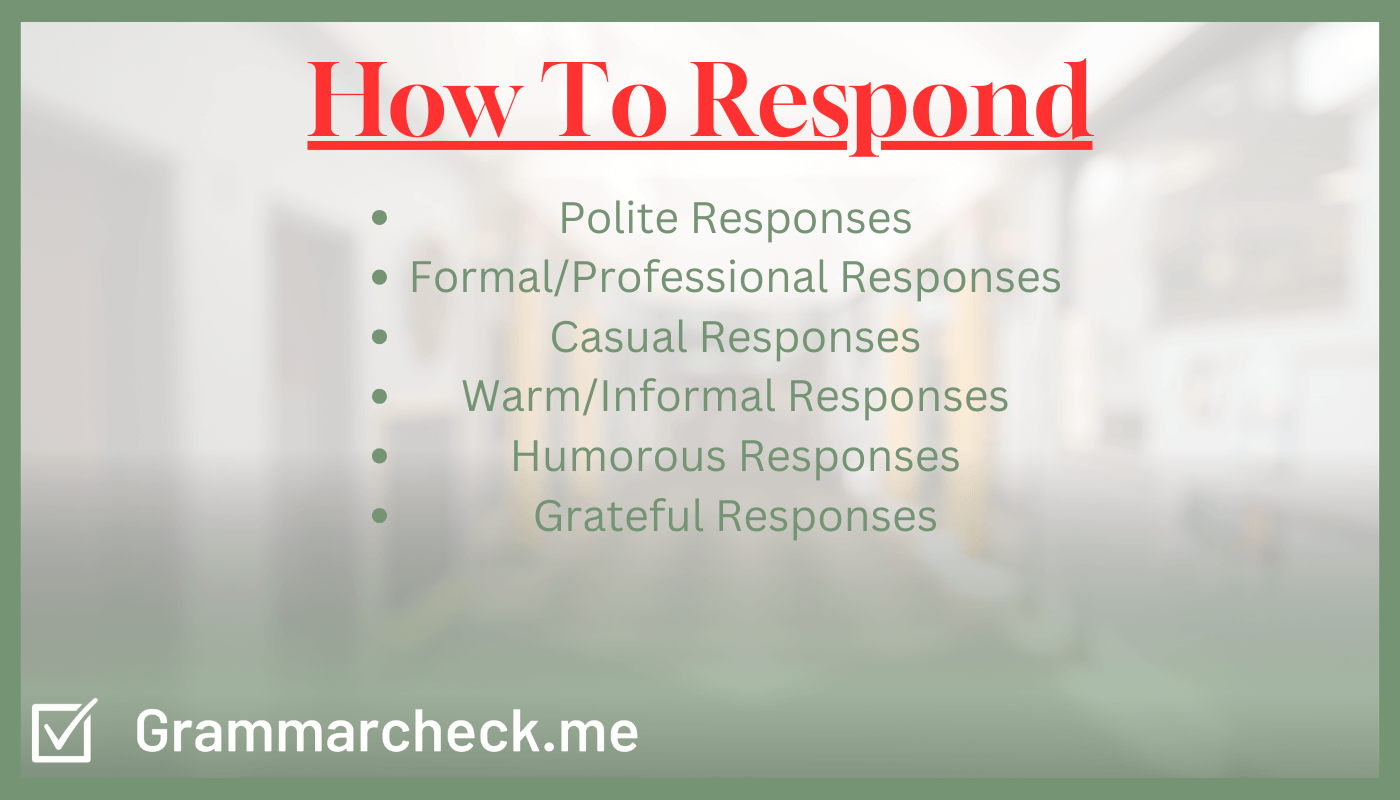“Thank you” is one of the most popular ways to express appreciation or gratitude in the English language. But what’s the best way to respond to “thank you”?
Writers need to heavily consider the context before picking the best response. There are Polite Responses, Formal Responses, Casual Responses, Informal Responses, Humorous Responses, and Grateful Responses. In this post, we’ll give you 30+ ways to respond when someone says “thank you”!

What Does “Thank You” Mean?
The expression “thank you” is a universally recognized expression of gratitude and appreciation. There are many different reasons for someone to use the phrase thank you (i.e. response to a kindness, assistance, or generosity).
When someone says “thank you,” they are expressing their thanks, indicating that they are grateful for something that has been done for them. But as it turns out, the context of the conversation heavily impacts the correct response.
Why Is It Important To Respond To “Thank You” Correctly?
Picking the correct response is important because the answer changes depending on the context of the situation. Using the wrong response could come off socially awkward or even rude.
In the sections to come, we’ll dice deeper into the best ways to appropriately respond to “thank you” depending on the writing context.
How To Respond To “Thank You”
It’s very important to demonstrate your appreciation for another person’s gratitude by responding appropriately to “thank you”. The best way way to respond to “thank you” directly depends on the context of the conversation. Consider the following types of conversations.
- Polite Responses
- Formal/Professional Responses
- Casual Responses
- Warm/Informal Responses
- Humorous Responses
- Grateful Responses

Polite Responses
Here are a list of 5 different ways to respond to “thank you” in a polite manner.
- You’re welcome. A standard and polite way to acknowledge someone’s gratitude.
- My pleasure. Indicates that the person was happy to help and finds fulfillment in doing so.
- It was nothing. Implies that the favor or assistance given was not a big deal and the person is happy to help anytime.
- No problem. Suggests that helping was easy and didn’t cause any inconvenience.
- You got it. Indicates a willingness to fulfill the person’s requests or needs in the future.
Just like we saw in our post about the saying “thanks for letting me know“, writers need to match their vocabulary choice to the context of the situation.
Formal/Professional Responses
Here are a list of 5 different ways to respond to “thank you” in a professional manner.
- I appreciate your gratitude. A formal way to acknowledge thanks, often used in professional settings.
- Thank you for your kind words. A gracious response, especially when the thanks are for a specific compliment or gesture.
- I’m glad I could assist. Often used in professional contexts to acknowledge thanks for specific help or services.
- You’re very welcome. A formal way of expressing that the person’s thanks are deeply appreciated.
- I’m pleased I could be of help. Indicates professional satisfaction in being able to assist the person.
Just like we saw in our analysis of the word rapport, writers need to match their vocabulary to the formality of the situation.
Casual Responses
Here are a list of 5 different ways to respond to “thank you” in a casual way.
- Sure thing. Indicates a willingness to help again in the future, often used in casual settings.
- Don’t mention it. Similar to “it was nothing,” indicating that the favor was small and not worth mentioning.
- No worries. Suggests that the person should not worry about imposing, and their thanks are unnecessary.
- Anytime. Implies that the person is always willing to help and is open to assisting in the future.
- Happy to help. Expresses willingness and happiness in assisting the person, commonly used casually.
Just like we saw in our analysis of the slang term WYS, writers need to use informal phrases only in informal situations.
Warm/Informal Responses
Here are a list of 5 different ways to respond to “thank you” in a informal manner.
- Glad to be of help. Expresses happiness in being able to assist the person, indicating warmth and friendliness.
- You bet. Informal and friendly way to acknowledge thanks, suggesting a willingness to help again.
- Anytime at all. Indicates that the person is ready to help anytime, emphasizing their availability and eagerness.
- No sweat. Casual way of saying that helping was effortless and not a problem at all.
- It’s all good. Conveys a relaxed attitude, indicating that there’s no issue in helping and being thanked.
Humorous Responses
Here are a list of 5 different ways to respond to “thank you” in a funny manner.
- No need to thank me, just send money. A light-hearted and humorous way to respond to thanks, implying a playful tone.
- I know, I’m pretty amazing. Humorously acknowledges the thanks while adding a touch of self-deprecation or sarcasm.
- Well, I do try to be awesome. Playfully accepts the gratitude with a humorous twist, implying modesty.
- You’re welcome, I know I’m great. Responds humorously, acknowledging the thanks while playfully emphasizing their greatness.
- Thanks, I do take pride in my awesomeness. Responds with humor, accepting thanks in a playful and confident manner.
Grateful Responses
Here are a list of 5 different ways to respond to “thank you” in a grateful manner.
- I’m truly touched by your appreciation. Expresses genuine gratitude for the thanks received, indicating a deep emotional response.
- Your gratitude means the world to me. Conveys a strong sense of appreciation, emphasizing the significance of the thanks.
- I’m honored to have been able to help. Indicates a feeling of honor and privilege in being able to assist, expressing gratitude for the opportunity.
- Thank you for acknowledging my efforts. Appreciates the recognition of the effort put in, expressing gratitude for being noticed and appreciated.
- I’m thankful to have been of service. Conveys gratitude for being able to provide a service, emphasizing the gratitude for the chance to assist.
And just like we saw in our post about the saying “regret to inform you“, writers need to understand how to use synonyms to add variety their writing!
How Important Is Context When Choosing A Response To Thank You?
Context is paramount when choosing a response to “thank you.” The relationship between individuals, the setting, and the nature of the favor influence the choice. A formal setting may require a polite response, while in casual situations, a more relaxed reply is suitable, ensuring the response aligns with the context. Just like we learned in our post about the phrase “where you from?“, context determines the best time to use certain phrases.
Frequently Asked Questions
Yes, a response to gratitude can strike a balance between politeness and casualness. Politeness ensures respect, while a casual tone can make the exchange more friendly. Finding this balance is key, allowing the response to be warm and respectful, catering to the specific social context.
Yes, humor can be appropriate when responding to “thank you,” especially in light-hearted or informal interactions. However, it should be used judiciously, ensuring it aligns with the relationship and the situation. A well-placed humorous response can add charm, but it’s crucial to gauge the atmosphere and the other person’s receptiveness to humor.
The Bottom Line
By now you should have a great understanding of how to respond to the expression “thank you”. Before picking your response, writers need to consider the context of their specific conversation. There are response that are best for casual and formal settings. The most common response to “thank you” is “you’re welcome” because it works in just about any situation. Also, consider checking out our Grammar check tool to make things easier.
